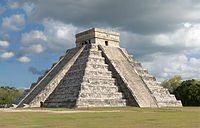Pre-Columbian

Pre-Columbian refers to the time period in the history of the Americas before Christopher Columbus arrived in 1492. This time period is also sometimes referred to as the "pre-contact" era because people living in the Americas at this time had not yet made contact with Europeans.
During pre-Columbian times, many different indigenous societies existed throughout the Americas. These societies varied greatly in terms of their culture, religion, technology, and way of life. Some societies were completely nomadic and lived off the land by hunting and gathering. Others were more sedentary and relied on agriculture to survive.
The pre-Columbian period in the Americas is also characterized by many significant achievements and discoveries. For example, many indigenous societies developed complex forms of government, art, and architecture. They also developed complex systems of writing and mathematics, and had great knowledge of astronomy and medicine.
Unfortunately, the pre-Columbian period also saw a lot of violence and conflict. Warfare was common among indigenous societies, and some societies practiced human sacrifice as part of their religious rituals. The arrival of Europeans in the Americas would eventually lead to the downfall of many of these indigenous societies and the loss of many cultural traditions and languages.
During pre-Columbian times, many different indigenous societies existed throughout the Americas. These societies varied greatly in terms of their culture, religion, technology, and way of life. Some societies were completely nomadic and lived off the land by hunting and gathering. Others were more sedentary and relied on agriculture to survive.
The pre-Columbian period in the Americas is also characterized by many significant achievements and discoveries. For example, many indigenous societies developed complex forms of government, art, and architecture. They also developed complex systems of writing and mathematics, and had great knowledge of astronomy and medicine.
Unfortunately, the pre-Columbian period also saw a lot of violence and conflict. Warfare was common among indigenous societies, and some societies practiced human sacrifice as part of their religious rituals. The arrival of Europeans in the Americas would eventually lead to the downfall of many of these indigenous societies and the loss of many cultural traditions and languages.
Related topics others have asked about:
